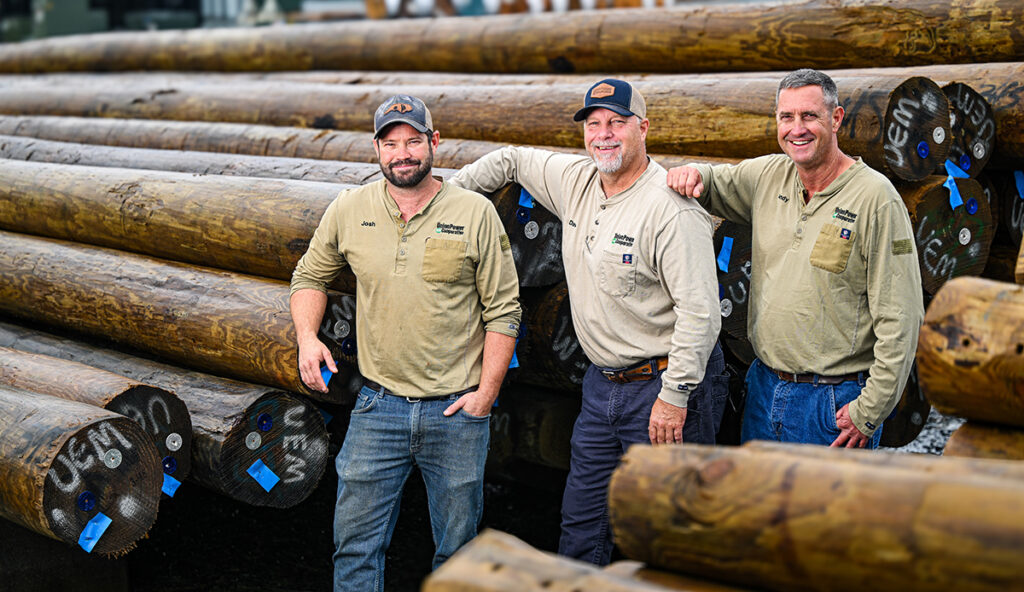
Editor’s note: This is the latest installment in our series of stories looking back at Hurricane Helene’s impact on electric cooperatives. Read the rest of the series here.
You sign up for the job knowing there’s a good chance you’ll be away during birthdays and holidays and pregnancies. Some nights, you’ll be squeezed into your truck bed because of your aversion to sleeping on a cold cot with a bunch of snoring men, one of whom insists on a wakeup alarm of “Enter Sandman” at 4:15 a.m. All manner of insects and snakes await you, and your clothes will drip with perspiration before most people wake up.

And you will work alongside cadaver dogs, as David Medlock and lineworkers from Union Power Cooperative did last September during Hurricane Helene. Helping hard-hit French Broad EMC in western North Carolina, Medlock and company detected the scent of decay and notified a field coordinator. Soon, a team of dogs and handlers was treading systematically 10 to 15 feet apart near a creek. Amid some relief, the smell of death was a cow caught in debris and underbrush.
It was part of the job, and Medlock, like the thousands of lineworkers who worked to restore power, is grateful for the experience. “I’m so thankful that I was selected for those days at French Broad. For what I’ve only done for 36 years, I get to go give that back to those people,” he said.
There’s no exact count of the number of co-op crews that rebuilt systems ravaged by Helene. Lineworkers from a record 28 states were on the job, and information supplied by 13 statewide associations outside of the hurricane’s path puts the count at 1,500 storm soldiers from 175 co-ops. Together, they helped to light up 1.44 million members from Florida to Kentucky.
Just like they did after Katrina, Rita, Michael, Sandy, Hugo and any storm where another co-op is in distress. “I’ve had a bag packed for 30 years,” said Brian Street, crew leader at Rutherford EMC in Forest City, North Carolina. “I’ve got a bag in my hand. I’m ready.”
It was not a bobcat
Marshalltown, Iowa, is not a place to which a southeastern electric cooperative would ordinarily turn for help. But Helene was not an ordinary storm. With many mutual aid crews committed to cooperatives in Florida and Georgia, co-ops unexpectedly walloped by Helene required assistance from their far-flung counterparts.
“We did have a little heads-up on this one, maybe a day ahead of time,” said Cody Beach, part of a four-member team from Consumers Energy Cooperative in Marshalltown that maneuvered a digger truck, a bucket truck and a three-quarter-ton truck more than 1,000 miles through St. Louis and Atlanta.
The destination was Blue Ridge Electric Cooperative in Pickens, South Carolina, where heavy rains and wind gusts of 70 mph downed more than 950 poles and put 90% of the membership in the dark at peak.
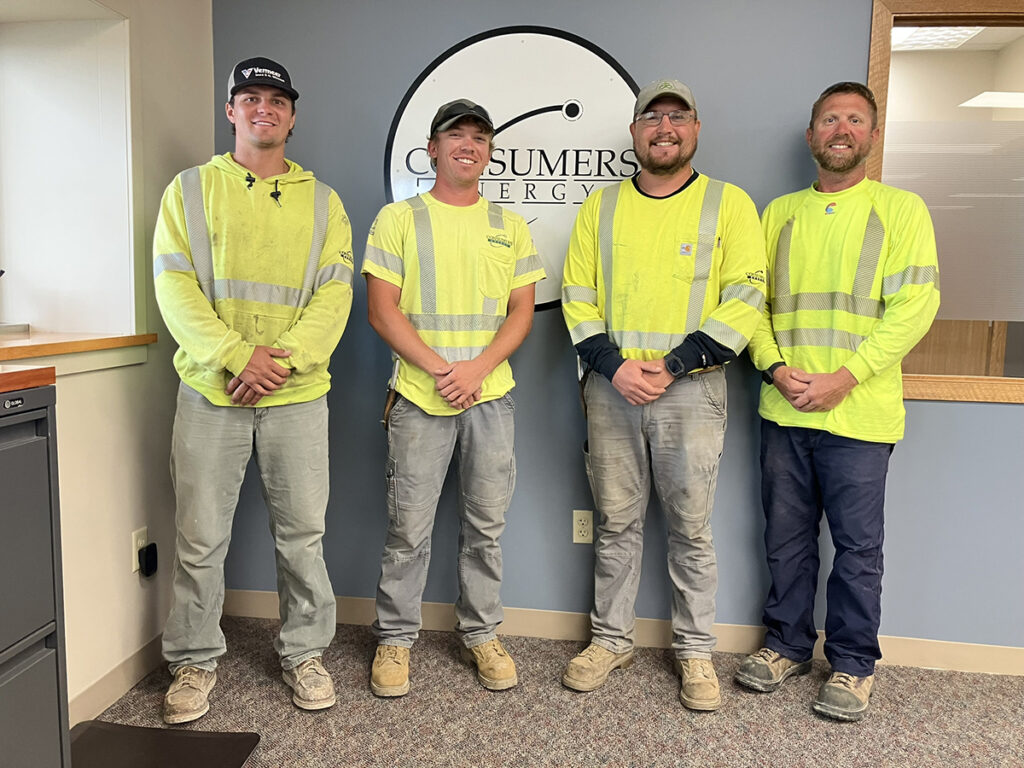
Colby McMorran, part of the Consumers Energy team with Max Upah, Ross Randall and Beach on their first trip to the Carolinas, said the damage didn’t register until a field leader, also known as a bird dog, took the team into the back roads.
“When we first got there, we were like, ‘Where’s all the damage at?’ It didn’t look as bad as they were reporting. But once we got in there, there was just a bunch of downed trees and everything that was causing issues,” McMorran said. “They got 13 or 14 inches of rain. So whatever way the tree was the heaviest, that’s the way it fell. There was no rhyme or reason; not all the trees were lying the same way.”
At Blue Ridge, they brought their tricks of the trade, a little cross-pollination between lineworkers who don’t know each other. “When we take wire up over a road, we physically grab it with our hand and take it up there with us,” McMorran explained. “They use a hand line for everything and somebody brings it to them. They were interested that we did it that way, which is quicker for us.”
They got 13 or 14 inches of rain. So whatever way the tree was the heaviest, that’s the way it fell. There was no rhyme or reason; not all the trees were lying the same way
Colby McMorran, Consumers Energy
The week of work was worth the travel and travail, though, Upah said. The crew was taking a lunch break while their bird dog energized a line.
“All of a sudden, we just hear a scream. I thought it was a bobcat at first because I didn’t know if they had bobcats down there. But then it turned out that the power got turned back on and we heard a bunch more like whooping and hollering. It was the locals happy that their power was back. That was pretty neat.”
Banana spiders
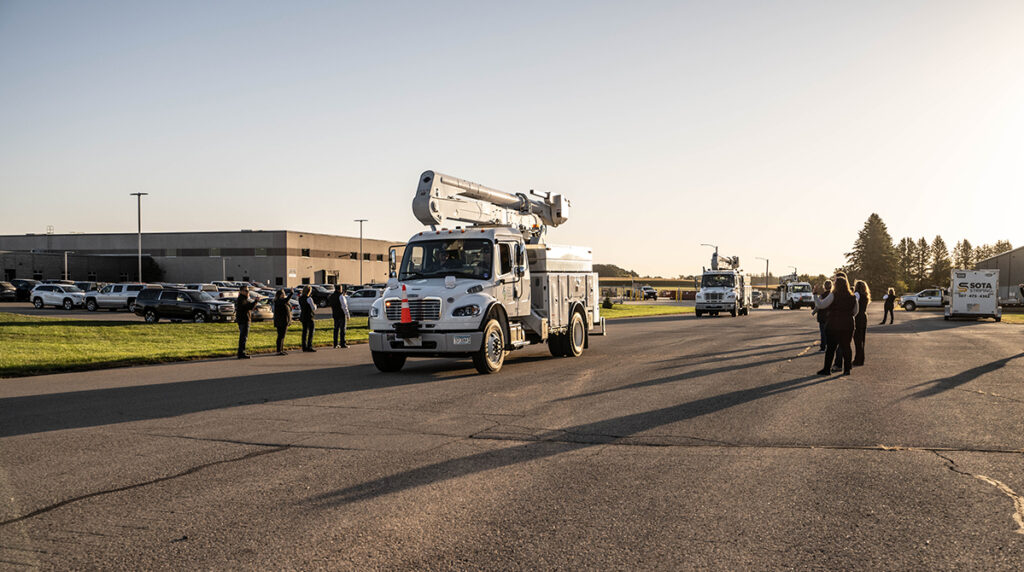
Two hours north of Marshalltown, the call came into Freeborn Mower Electric Cooperative in Albert Lea, Minnesota, and within about 12 hours, three trucks with six lineworkers headed to Blue Ridge in South Carolina.
The drive took parts of two days and the team arrived a few days into the storm. “By the time we got there, they were more toward the end and we were picking up single-phase lines where trees had fallen,” said Eric Ruddle of Freeborn Mower. The biggest nuisance, he said, was untangling wires with banana spiders crawling all over them.
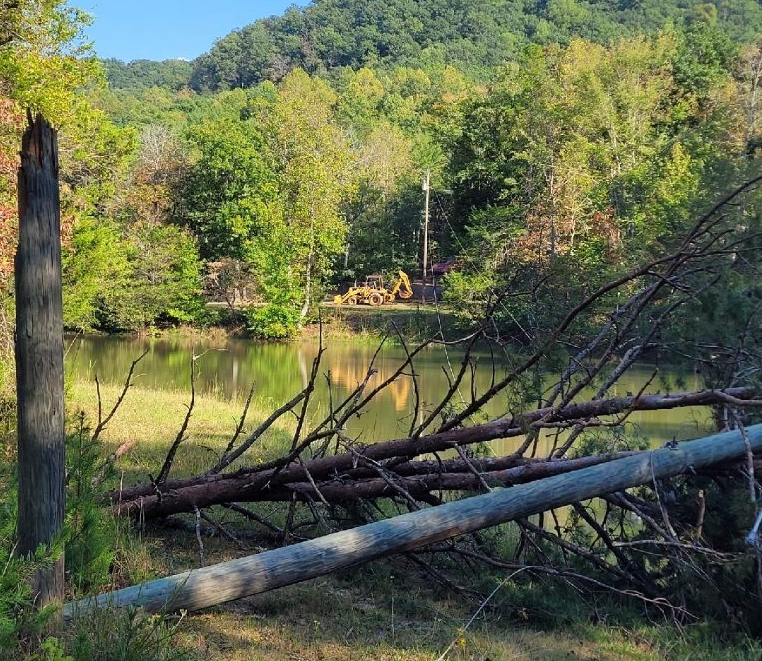
“You walk through the woods and you say, ‘I can get over there. That looks like a nice trail,’ and all of a sudden, you’ve got a web in your face. Those aren’t like cobwebs we get in our house here,” he said.
In fact, that’s why Tristan Varpness of Freeborn Mower passed up sleeping in a main tent setup that accommodated about 300 workers in favor of a hammock in a truck. “You’d lock in the tent door and they would scurry into the holes of that floor. That’s why I slept in a hammock. They were everywhere.”
The Freeborn Mower team helped Blue Ridge complete restoration within about two weeks and was two hours into the return trip home when the phone lit up. Another hurricane was threatening Florida. Were they interested in turning south into an absolute unknown? “We started driving before we even knew what co-op we were going to,” said Ruddle, as four of the six headed toward Hurricane Milton.
We started driving before we even knew what co-op we were going to.
Eric Ruddle, Freeborn Mower EC
At the time, Varpness’ wife was about four months pregnant; their son was born in February. But she understands the lineworker life. She might not have been thrilled, Varpness said, but “she always knew that was a part of it. When me and my wife met, that was my first hurricane on Laura [in 2020]. So she knows there’s always a possibility, even if we were on our way home.”

Unlike the Blue Ridge experience, when Freeborn Mower lineworkers arrived well into restoration, they were among the first out-of-state crews to deal with Milton, which struck Oct. 9. They stayed the first night in a hotel in the Panhandle and then headed to Peace River Electric Cooperative, headquartered in Wauchula, with about 57,000 members off the grid.
“We were kind of out in farm country, so it was more poles down here and there. Another Minnesota co-op was out on the coast and all they were talking about was how much water they were wading through,” Ruddle said. Regardless, it was hot and muggy, and snakes and alligators replaced the South Carolina webspinners.
In all, most of the Freeborn Mower lineworkers were gone for 15 days. They have a rotation system in the office now, so it’s easy to see who is up for the next big storm. “If I’ve got the option,” Ruddle said, “I’m going.”
Acquaintances old and new
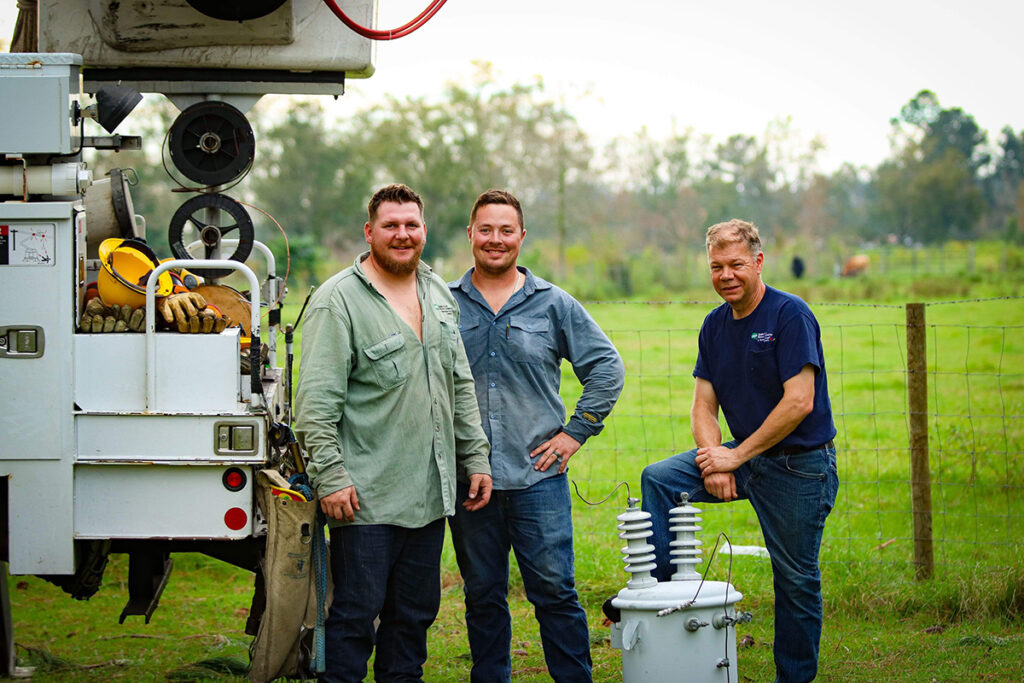
If Jeff Rowen is in your service territory, then you know something bad has probably happened and something good is about to. Chief coordinator at Sussex REC in Sussex, New Jersey, Rowen was on the scene and helped restore power after storms such as Hurricanes Rita in 2005 and Sandy in 2012. But what he saw at Satilla REMC in Alma, Georgia, was as bad as anything he experienced in a career that spans three decades.
“We were two hours north of Satilla and you couldn’t drive down the line without seeing wire or trees down. There was no power anywhere. So we said, ‘Boy, we’re going to be in the heart of it when we get down there.’ And we were; there was next to nothing on.”
Ironically, Rowen and three lineworkers from Sussex could have taken the easy way out—they helped Habersham EMC in Clarkesville, Georgia, clean up and then had the option of returning home or pushing on to Satilla REMC.
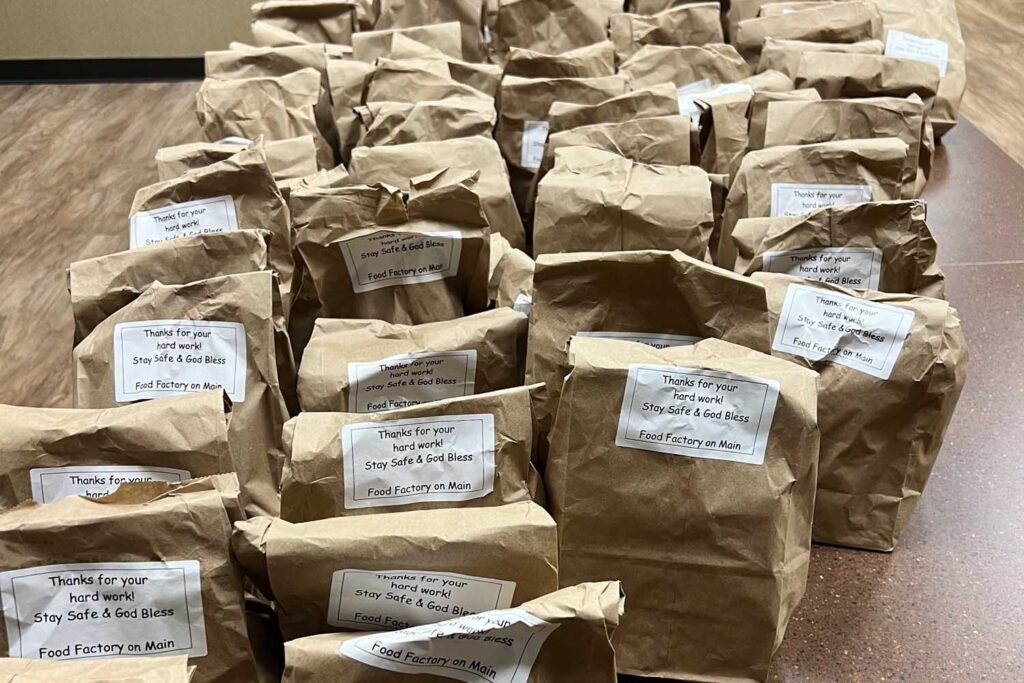
Weighing the decision in a hotel room, Rowen was blunt with younger colleagues on their first major hurricane assignment, including Jake Hasert, who otherwise would have been on his honeymoon after his marriage on Sept. 21.
“You’re going miss your families and it’s not going to be easy. There’s not going to be any convenience store. You’re not going to go to the gas station to get something cold to drink. It’s going to be what we have on the trucks and in the tents and that’s it,” he said. “And we were like, ‘Well, let’s go down.’”
Once in Satilla EMC’s low-density territory two hours northwest of Jacksonville, Florida, it was clear Rowen soft-pedaled the situation, if anything. “When we left Habersham, I didn’t see a rock for three weeks. We did not dig one rock. It was like digging at the beach down there. It was just like sand. It was amazing.”
Satilla CEO Romeo Reyes couldn’t get out of his driveway, so he drove his tractor to work. Another trapped lineworker drove a four-wheel after chain-sawing his way to a road. In all, 58,000 members were out, essentially the entire system, and the co-op would require 2,000 lineworkers from various utilities to bring back electricity.
“Satilla did a real good job at organizing it, having the tree crews out ahead of us and having things already cleaned up by the time we got there,” Rowen said. “We really worked by ourselves, four of us for the most part, and then they eventually they teamed us up with six other guys from Pennsylvania. But they definitely had a lot more damage than Rita did as far as wind damage went.”
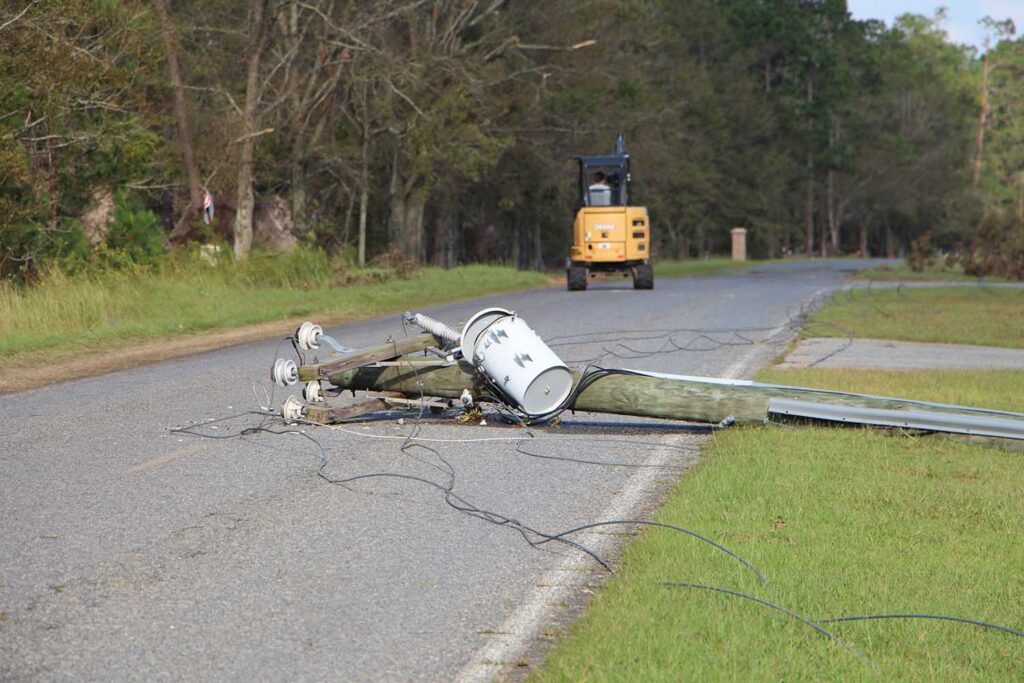
Rowen ended up making two two-week trips to Satilla EMC, cycling the rest of the crew members in and out; that’s where they encountered the “Enter Sandman” afficionado. “It was definitely rough, but the guys were really enjoying the experience. It’s like no other when you’re living in a man camp and then doing stuff with a couple hundred other guys who are doing the same mission as you. There’s nothing else like it.”
Helene brought Rowen’s storm work full circle when he encountered a lineworker he had not seen since they were in a picture together in 2005, two of hundreds of men living on an airbase in Jennings, Louisiana, helping Jefferson Davis Electric Co-op get on its feet after Rita.
“I ran into him in Georgia and we thought it was pretty funny. I didn’t even recognize him; he recognized me. I hadn’t seen him and I always wanted to touch base with him, but we just never crossed paths again. And so I thought that was pretty amazing.”
Mutual aid legacy

Every storm is different; even seasoned lineworkers say they take away something new every time they go on a major call.
Mutual aid crews used to flat ground found new demands on their bodies in the hills and mountains in Blue Ridge Energy’s North Carolina territory. “The terrain was what got us the most,” said Phil Collison, one of nine lineworkers who left Delaware Electric Cooperative in Greenwood on Oct. 1.
“It took a few days for some of us who were even in decent shape to get used to it. Our legs were sore in the evening, for sure, but a nice, hot shower and a soft bed helped.” A 30-year veteran of the trade, Collison said lineworkers acclimated to the conditions, though he joked, “Next time, bring more rope.”
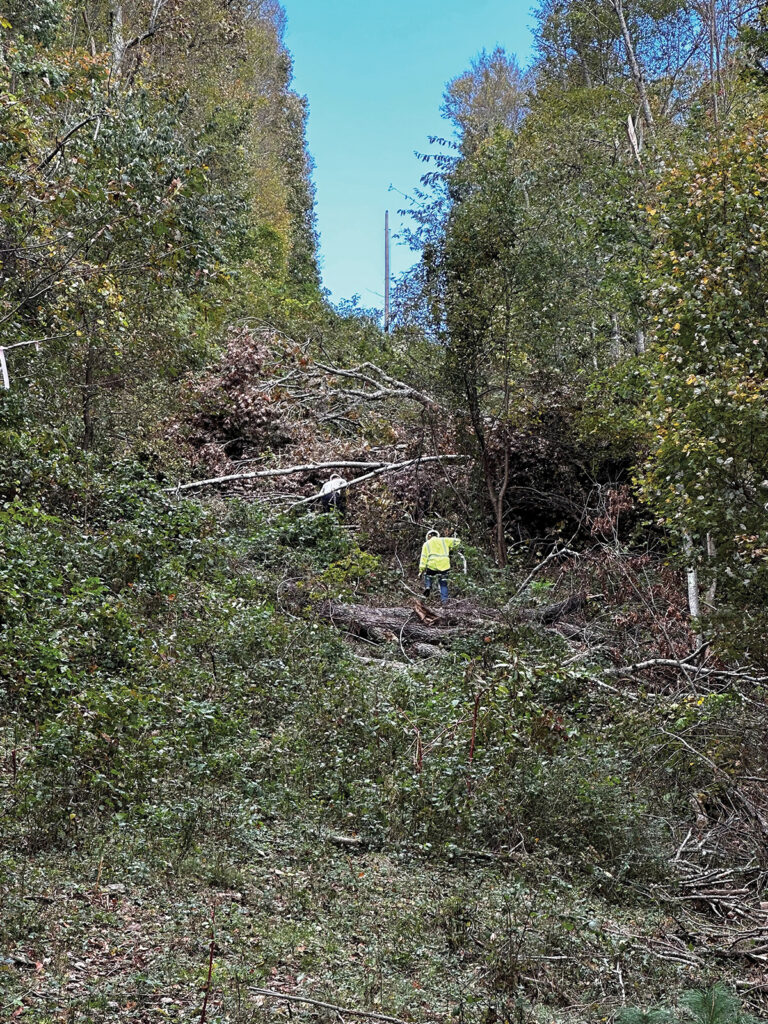
Jason Brown, safety and loss control instructor for the Oklahoma Association of Electric Cooperatives, which dispatched 110 mutual aid lineworkers, took notes on how Jefferson Energy Cooperative in Wrens put crews through safety meetings and briefings almost upon arrival. He said he brought back ideas to expand on the safety process in his state.
“They established at the start, ‘Hey, we want your help, but we want you to be safe and go home,’” said Brown, who kept tabs on 12 crews a day in Georgia. “We do talk to them about voltage and what size gloves and grounds we need to wear. But when you go to sit in a classroom and get handouts like they did, that impressed me very much.”
Lineworkers from Licking, Missouri-based Intercounty Electric Cooperative Association used a boat in less familiar territory for the first time. Working in Georgia, a crew tried to retrieve some wire that had fallen across a pond. Construction Foreman Jason Greear borrowed a member’s boat, paddled to the wire and handed it to his crew to pull out of the water.
“It was pretty funny, watching him out there trying to paddle that wire across,” said Aaron Scantlin, construction foreman at Intercounty, which dispatched two rounds of 10 lineworkers each to help at three Georgia co-ops. “But it was an example of doing what you needed to do under the circumstances.”
All in the call of duty.

“Every lineman—I don’t care who you are—every lineman is watching the weather. We’re looking at our phone and our outage apps and we’re saying, ‘We might be going to Georgia, we might be going to South Carolina,’” said Medlock, among an initial Union Power wave of 16 lineworkers who headed to French Broad EMC, working three or four hours to get one house lit.
When the power comes back, though, as it did one night after Union Power worked all day in a valley, the cadaver dogs and sleepless nights and endless hours on the road tend to fade away.
“The porch lights came on and people started whooping and hollering. You hear them—‘Thank you, thank you, sir.’ One of our guys, it was his first time and he never experienced anything like that. They kept hollering and as we were driving out the road to go back, people were flashing their lights and coming out on the porch hollering,” Medlock said.
“That’s your bonus check.”
Coming next week
In the final installment of this series, we look at Hurricane Milton, somewhat forgotten in the aftermath of Helene, but still very much on the minds of staff and members at one co-op in Florida.
Contributing writer Steven Johnson is a former managing editor at NRECA, where he started in 2005, and former editor of Cooperative Living and vice president at the Virginia, Maryland & Delaware Association of Electric Cooperatives
Banner Image Courtesy Aiken Electric Cooperative
